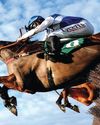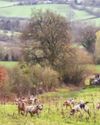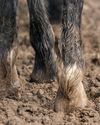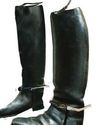
LOOKING after leather can save your hide financially. Good quality equipment is expensive, but correct care could give you around 20 years’ use.
The basics of traditional leather maintenance remain, but regimes have changed. The old rule of dismantling tack and cleaning it after every use isn’t realistic, and may not be necessary for most owners, says Society of Master Saddlers (SMS) master saddler and bridle maker Catherine Baker from Wylye Valley Equine, Wilts.
“If your horse works hard and gets sweaty, then ideally you should clean your tack thoroughly every time you ride,” she explains. “If he doesn’t, or you’re only riding for short periods, once a week should be enough.”
SMS master saddler and British Equestrian Federation consultant Mark Fisher agrees.
“Taking tack apart and cleaning after every use is ideal, but while this was fine in the days when grooms had to be kept busy, it’s not practical for most people any more,” he says.
However, a quick wipe with a damp cloth after every use minimises the build-up of dirt and grease and helps inhibit mould growth.
The SMS advises following manufacturers’ instructions and using non-chemical products.
“Wipe off grease and dirt with a clean, damp cloth wrung out in lukewarm water, then clean with a natural product,” says Catherine. “Anything chemical-based can damage or discolour leather.
“Having said that, if it’s so bad you can’t get the dirt off, you can add a drop of washing-up liquid to the water.”
Professional grooms often use oldfashioned woven dishcloths or face flannels, as these have textured surfaces that don’t scratch the grain (smooth) side of leather.
Esta historia es de la edición January 16, 2020 de Horse & Hound.
Comience su prueba gratuita de Magzter GOLD de 7 días para acceder a miles de historias premium seleccionadas y a más de 9,000 revistas y periódicos.
Ya eres suscriptor ? Conectar
Esta historia es de la edición January 16, 2020 de Horse & Hound.
Comience su prueba gratuita de Magzter GOLD de 7 días para acceder a miles de historias premium seleccionadas y a más de 9,000 revistas y periódicos.
Ya eres suscriptor? Conectar

Gemirande provides 24-carat magic
Venetia Williams sparkles again in the December Gold Cup and jockey brothers dead-heat

‘Happy hunting, everyone'
“The season for talks, dinners and parties has finally arrived for Tessa Waugh, whose distress about the snags of middle age fades away with some rousing festive spirits

'Monaco deserved this victory
Seemingly destined always to play the bridesmaid’s role, Harrie Smolders’ great partner Monaco finally tops an incidentpacked Rolex grand prix

'It had to end sometime'
The closure of beloved Hampshire saddlery Calcutt Sons is a loss to the hunting and wider equestrian worlds, as Octavia Pollock reports

'You couldn't want for more
The Ludlow's peaceful country makes for a day in \"hunting paradise\"

The greatest gift of all
Christmas is fast approaching and while we all like a bit of tinsel, the festive season is also a perfect time for giving to a horse charity. Niki Hinman finds out some of the options

Winter him well
A horse's winter routine can differ dramatically from his summer structure but what’s the knock-on effect? Ellie Hughes asks vets how to optimise routine management for the season

Neat feet
Excellent hoof care is a year-round concern but the winter months present their own problems. Richard Stephenson MRCVS explains the seasonal challenges afoot and how to stay one step ahead

In bygone days
Modern vets have much scientific knowledge behind them, but what about their forebears? Kieran O’Brien MRCVS opens up the world of Victorian vets in London

'When I joined the Pony Club it was just two boys and 48 girls'
Pepsi Kohler on being delightfully outnumbered by girls in the Pony Club, a leg-up from a royal and the H&H advert that changed his life